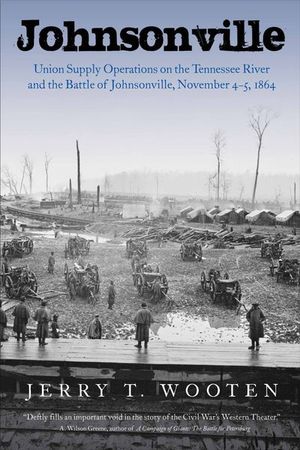Johnsonville
Published by Savas Beatie
This study of the importance of the little-known Civil War battle is “a well written, thoroughly researched, amply illustrated, and engaging story” (Civil War Courier).
The name Johnsonville doesn’t mean much to most students of the Civil War. Its contribution to Union victory in the Western Theater, however, is difficult to overstate, and its history is complex, fascinating, and until now, mostly untold. Now Jerry T. Wooten, Ph.D., a former Park Manager at Johnsonville State Historic Park, has unearthed a wealth of new material that sheds light on the creation and strategic role of the Union supply depot, the use of railroads and logistics, and the depot’s defense. His study covers the emergence of a civilian town around the depot, and the role all of this played in making possible the Union victories with which we are all familiar.
This sterling monograph also includes the best and most detailed account of the Battle of Johnsonville. The fighting took place on the heels of one of the most audacious campaigns of the war, when Confederate Maj. Gen. Nathan Bedford Forrest led his cavalry through western Tennessee and Kentucky on a 25-day campaign. On November 4–5, 1864, Forrest’s troops attacked the depot and shelled the town, destroying tons of valuable supplies. The complex land-water operation nearly wiped out the Johnsonville supply depot, severely disrupted Gen. George Thomas’s army in Nashville, and impeded his operations against John Bell Hood’s Confederate army. Prior works on Johnsonville focus on Forrest’s operations, but Wooten’s deep original archival research reveals significantly more on that battle, as well as what life was like in and around the area for both military men and civilians.
The name Johnsonville doesn’t mean much to most students of the Civil War. Its contribution to Union victory in the Western Theater, however, is difficult to overstate, and its history is complex, fascinating, and until now, mostly untold. Now Jerry T. Wooten, Ph.D., a former Park Manager at Johnsonville State Historic Park, has unearthed a wealth of new material that sheds light on the creation and strategic role of the Union supply depot, the use of railroads and logistics, and the depot’s defense. His study covers the emergence of a civilian town around the depot, and the role all of this played in making possible the Union victories with which we are all familiar.
This sterling monograph also includes the best and most detailed account of the Battle of Johnsonville. The fighting took place on the heels of one of the most audacious campaigns of the war, when Confederate Maj. Gen. Nathan Bedford Forrest led his cavalry through western Tennessee and Kentucky on a 25-day campaign. On November 4–5, 1864, Forrest’s troops attacked the depot and shelled the town, destroying tons of valuable supplies. The complex land-water operation nearly wiped out the Johnsonville supply depot, severely disrupted Gen. George Thomas’s army in Nashville, and impeded his operations against John Bell Hood’s Confederate army. Prior works on Johnsonville focus on Forrest’s operations, but Wooten’s deep original archival research reveals significantly more on that battle, as well as what life was like in and around the area for both military men and civilians.
BUY NOW FROM
COMMUNITY REVIEWS

